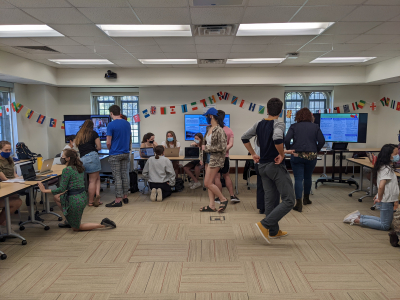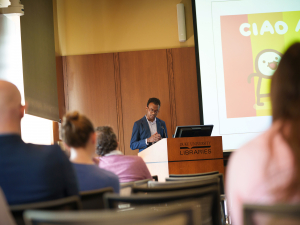Sustainability Through Language: Reimagining the French Curriculum Through an Environmental Lens

Last fall, Duke’s announcement of the Duke Climate Commitment included a call to center climate and sustainability fluency across the undergraduate curriculum. The invitation aligned perfectly with the plans Senior Lecturers of Romance Studies Laura Florand and Sandra Valnes Quammen have for the French Language Program.
Indeed, their initiative, Teaching (for) Sustainability in French, seeks to expand existing engagement within the French Language Program with sustainability themes through topics related to the environment, social justice, equity and cultural heritage. Duke is “In it for life”, and through interdisciplinary initiatives such as this we are one step closer to making this commitment sustainable.
We sat down with Florand and Quammen to discuss the role of languages in conversations about sustainability and the future of the French and Francophone Studies curriculum. This interview has been lightly edited for length and clarity.
To start, tell us a bit about yourself and what motivated you to pursue such a project.
Florand: I think most of us who love languages do so because they hold the world in them. So it’s natural to want to tie in the joy and discovery of the world that is inherent to language learning to teaching students and ourselves how to repair and regenerate our relationships with the world and community. We’ve always wanted to pass on a beautiful world to students, but we’ve grown to realize that engaging students with ways to protect that world is part of passing it on.
Quammen: In recent years, more and more of our students have also expressed a desire to think about the ways in which sustainability conceived broadly — environmental sustainability, but also social justice and equity — connects to their study of French. In classes from French 101 all the way to advanced French courses, students are engaging in discussions, projects and research that make these connections salient, meaningful and personal. We’re excited to be able to think about ways to infuse this type of work into all our courses and for all our students.
What is Teaching (for) sustainability in French? How does it fit into the context of the current French language program, your past work, and future aims?
Quammen: Teaching (for) Sustainability in French aims to completely reimagine instruction in the French Language Program in order to integrate themes of sustainability, environmental and social justice, and equity at all levels of instruction in the French Language Program; to foster integrative, hands-on student experiences both at home and abroad; and to foster a culture of ongoing professional development amongst faculty that would allow them to more fully integrate a variety of perspectives and of voices in the Francophone world into their teaching.
Did you receive any funding for this project?
Quammen: We’re pursuing this project thanks to generous funding from two grants — an Empowering French and Francophone Studies grant awarded by the French Embassy and the FACE Foundation, and funding from the Undergraduate Program Enhancement Fund (UPEF).
The Empowering French and Francophone Studies grant funds projects for a period of two years, and recognizes innovative work that fosters equity, inclusion and social justice in French and Francophone Studies. This funding will support French Language Program faculty as we articulate the intersections of language education and sustainability education and design curricular materials that explore these intersections for students in all our courses.
The UPEF are program experimentation grants made available by the Provost for experimentation and innovation related to several themes identified in the 2030 Report as priorities for undergraduate education. This grant provides support for the redesign of entire courses, funding to integrate more hands-on student experiences into classes, and will help us to create and sustain collaborations between French Language Program faculty and faculty members in other departments and programs across campus and abroad.
Is there anything else you’d like readers to know?
Florand: We are excited to take on such a major initiative in the French Language Program and grateful for the support we have received not only from Duke, but from the French Embassy. We plan to collect undergraduate feedback as part of the initiative, so we are looking forward to engaging even more closely with our students as we take this regenerative approach to our language pedagogy.
Quammen: While the natural and environmental sciences are perhaps the disciplines that most often come to mind when we think about “sustainability”, we firmly believe that language programs have a vital role to play in this work. Being able to communicate across languages, to explore and understand different perspectives and perceptions of the world, and to think about what it might mean to be a “global citizen” are critical components of imagining and working toward a more sustainable future.
____________________
Ashley Alcantar Magana is a Trinity sophomore on the pre-medicine track majoring in Neuroscience with a minor in Chemistry and the Latino Studies in the Global South certificate. She is a work-study student in the Department of Romance Studies and enjoys creative writing and reading in her free time.





